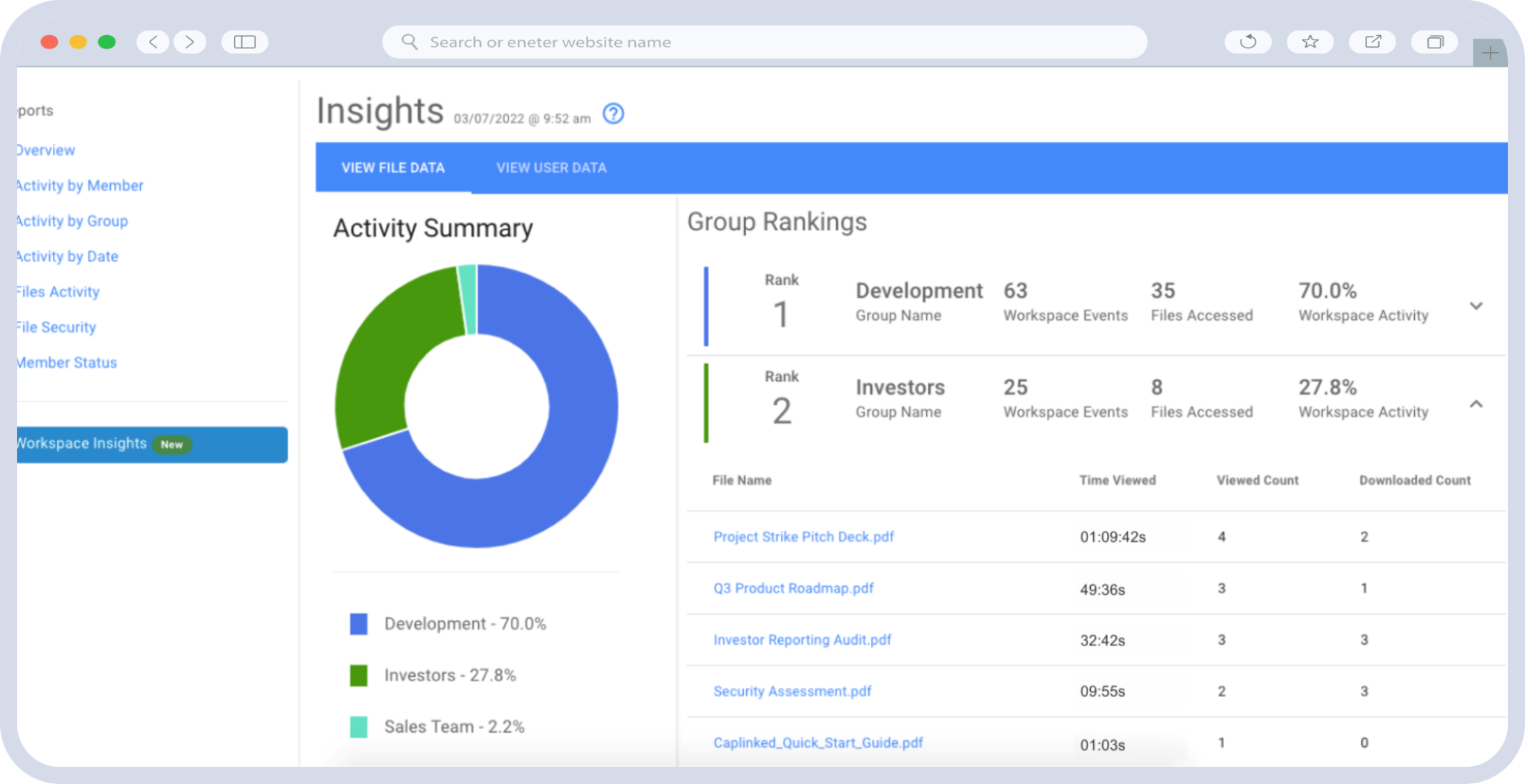Table of Contents
ToggleThe New Language of Dealmaking
In 2025, due diligence no longer ends with financial statements and revenue projections. Today, the question defining mergers, acquisitions, and capital transactions is broader — and far more consequential: Can we trust how this company manages its information?
In a world of expanding regulatory scrutiny, data breaches, and third-party risk exposure, governance has become the new due diligence. For investment bankers, private equity firms, and corporate buyers, assessing an organization’s financial performance is no longer enough. They need visibility into how that organization safeguards its data, complies with cybersecurity frameworks, and manages information across its ecosystem. And for deal teams using CapLinked, the leading secure virtual data room (VDR) platform, that shift represents an opportunity — to transform compliance from a barrier into a strategic advantage.
The Expanding Scope of Due Diligence
From Financials to Governance
Historically, M&A due diligence focused on a company’s financial health: assets, liabilities, contracts, and revenue. But in 2025, regulators and investors are holding acquirers responsible for more than balance sheets. Modern diligence now includes:
- Cybersecurity posture — How does the target handle data protection and access control?
- Compliance readiness — Is the company aligned with frameworks like SOC 2, NIST 800-171, GDPR, or CMMC?
- Operational resilience — How would the organization respond to a data breach or regulatory audit?
- ESG governance — Are risk and ethics integrated into leadership and reporting structures?
Each of these factors directly affects valuation, risk exposure, and even deal eligibility — particularly in government and regulated sectors.
Why Governance Now Defines Enterprise Value
Governance has evolved from a back-office policy function into a visible, quantifiable indicator of enterprise maturity. Analysts and acquirers now recognize that companies with strong governance are more resilient, less likely to suffer compliance penalties, and faster to integrate post-acquisition. In practical terms, governance diligence asks:
- Does the company know where its sensitive data lives?
- Can it prove who accessed key documents and when?
- Can it produce an immutable audit trail for regulators or investors on demand?
For many targets, the answer is no — and that’s now a deal-breaker.
The Hidden Risk in Every Deal: Data Exposure
Every deal requires information exchange. From early-stage evaluation to closing, thousands of documents flow between buyers, sellers, legal teams, auditors, and advisors. But in too many transactions, that process still relies on insecure methods: public cloud storage links, email attachments, or generic collaboration tools. The result?
- Sensitive contracts and IP scattered across multiple platforms.
- Contractors retaining access long after the deal closes.
- Limited traceability — or none — for what was shared and when.
This lack of control creates legal and reputational risks that persist long after signing day.
In some cases, leaked diligence materials have even triggered regulatory investigations, damaging trust before integration begins.
The Regulatory Catalyst: Compliance as a Deal Requirement
Across industries, compliance obligations have become embedded in M&A activity.
- Defense and Aerospace: CMMC and DFARS 252.204-7012 require all contractors — including targets and subs — to protect Controlled Unclassified Information (CUI).
- Finance: SOX, FINRA, and SEC cybersecurity rules demand proof of internal controls for sensitive data.
- Healthcare: HIPAA and HITECH enforcement actions now follow data through mergers, acquisitions, and divestitures.
- Technology: SaaS vendors operating under FedRAMP or SOC 2 must maintain certification through ownership transitions.
Buyers can no longer inherit unknown risk. They must verify that governance and compliance are operational — not aspirational — before the deal closes. This is where secure collaboration technology makes the difference.
CapLinked: The Governance Platform Behind Modern Due Diligence
CapLinked has powered thousands of complex transactions since 2010, from cross-border M&A and venture financings to IPO preparation and post-merger integration. But today, its platform has evolved into something more than a traditional data room. It’s a digital governance engine — a secure, auditable workspace that transforms how deal teams manage compliance during every stage of a transaction.
1. Secure Access Control Across Deal Phases
CapLinked enforces least-privilege access by design. Deal administrators can control exactly who sees what, at every stage:
- Preliminary Stage: Grant limited access to financial statements or company overviews.
- Due Diligence Phase: Enable granular folder permissions for legal, operational, and compliance data.
- Post-Closing: Automatically revoke external access and archive records for audit.
This eliminates one of the biggest diligence risks: oversharing. Each document stays encrypted (AES-256) and access is fully traceable — ensuring both transparency and containment.
2. Immutable Audit Trails and Compliance Evidence
In the age of governance-driven due diligence, evidence matters. CapLinked automatically logs every action in the platform — views, downloads, permission changes, uploads, and deletions — with timestamps and user attribution. These logs are immutable and exportable, providing instant compliance evidence for auditors, regulators, and internal review. For dealmakers, this means no more manual tracking, screenshots, or version confusion. For buyers, it’s reassurance that the transaction is being executed within a provably secure, compliant environment.
3. Post-Download Control with FileProtect DRM
Governance doesn’t stop when a file leaves the data room. CapLinked’s FileProtect DRM gives deal administrators the ability to revoke or expire access even after download — a feature few traditional VDRs offer. This prevents unauthorized distribution of confidential materials, ensuring that sensitive files can’t resurface in unauthorized hands months later. In governance-driven deals, where data handling directly impacts valuation, that level of control is essential.
4. Continuous Monitoring and Alerts
CapLinked enables real-time insight into who’s interacting with deal materials. Admins can track unusual behavior — such as large data exports, access from new users, or permissions being escalated. This proactive visibility supports not only governance best practices but also cyber due diligence — identifying potential insider risks before they become deal liabilities.
5. FedRAMP-Grade Security Infrastructure
For deals involving federal or defense assets, CapLinked’s GovCloud-hosted VDR offers a FedRAMP High-authorized environment for handling Controlled Unclassified Information (CUI). That means compliance with NIST 800-171, DFARS, and CMMC requirements from the infrastructure up. No other data room combines M&A usability with government-grade security — making CapLinked uniquely positioned for regulated or sensitive transactions.
Why Governance Is Redefining Valuation
The market has begun rewarding companies that can prove governance discipline.
Buyers and investors now assign tangible value to:
- Documented access control and auditability.
- Compliance certifications and control frameworks in place.
- Demonstrable information security culture.
Conversely, deals stall — or collapse — when governance gaps emerge late in diligence. If a target can’t provide evidence of compliance, cyber hygiene, or access accountability, it raises questions far beyond IT — it raises doubts about leadership and risk management. Governance, in effect, has become a proxy for operational excellence.
The Banker’s Perspective: Governance as a Deal Accelerator
Investment bankers and advisors play a pivotal role in navigating this new terrain. By recommending platforms like CapLinked early in the process, they can help clients:
- Accelerate readiness: Pre-stage diligence materials in a compliant, auditable workspace.
- Reduce deal risk: Control access across buyers, lawyers, and consultants.
- Demonstrate credibility: Provide buyers with evidence of governance maturity.
In a market where speed and trust drive value, secure collaboration has become a deal enabler. For defense contractors, SaaS vendors, and regulated enterprises, it’s no longer optional — it’s table stakes.
From Transactional to Transformational: The Governance Advantage
The best deal teams aren’t just closing transactions — they’re building governance into their operations. By treating CapLinked as more than a data room — as a governance system of record — they gain lasting advantages:
- Compliance evidence that carries over post-acquisition.
- Structured documentation for future audits or exits.
- Reduced third-party risk during integration.
Governance-focused diligence also creates smoother handoffs between deal teams, legal, compliance, and IT — minimizing post-close disruptions. In short: governance is the connective tissue between today’s deal and tomorrow’s enterprise.
Building the Future of Trusted Dealmaking
In 2025, governance and due diligence are converging into a single discipline — one that demands transparency, control, and accountability across the entire transaction lifecycle. CapLinked empowers deal teams to meet that challenge. By combining enterprise-grade security, immutable audit trails, and post-download control, it turns compliance from an obstacle into a differentiator.
For buyers, that means less risk. For sellers, it means higher confidence — and often, higher valuations. The next generation of deals won’t just be measured by multiples. They’ll be measured by trust. Governance is the new due diligence — and CapLinked is where it happens.




